They used to call it Greek tragedy when the fates wrought their revenge on human folly and weakness. But maybe a better term in the case of the folly and weakness of the modern Tory party is European tragedy. For, as a broken David Cameron announced his resignation on Friday morning, one question must have been battering his exhausted brain more than any other.
How was it that a modern-minded liberal Conservative leader who long ago told his party to “stop banging on about Europe” if it wanted to get back into power after three successive defeats – and who then delivered two terms in government – has himself been brought down by that same party over that same European question?
Cameron himself played the role of tragic hero as he notified the nation of his intention to step down before the autumn. “There can be no doubt about the result,” he said. “The British people have voted to leave the European Union and their will must be respected.”
But he added that the tortuous negotiations ahead with the EU would require “strong determined and committed leadership” that he felt he could no longer provide. “The country requires fresh leadership to take it in this direction.”
And there seemed scant consolation in his laconic summary of what he would rather be remembered for. “I believe we’ve made great steps, with more people in work than ever before in our history, with reforms to welfare and education, increasing people’s life chances, building a bigger and stronger society, keeping our promises to the poorest people in the world and enabling those who love each other to get married whatever their sexuality, but above all restoring Britain’s economic strength.”
All of that is likely to be forgotten in the European tumult. The warnings from history could not have been clearer. Party divisions over Europe had been the undoing of both Cameron’s predecessors as Conservative prime minister. Margaret Thatcher’s fall in 1990 was triggered by her increasingly anti-European rhetoric and stance. John Major’s long slide to defeat in 1997 was powered by his inability to prevent poisonous divisions over the Maastricht treaty on European integration. Right from the start of his own rise to the top, Cameron knew the dangers.
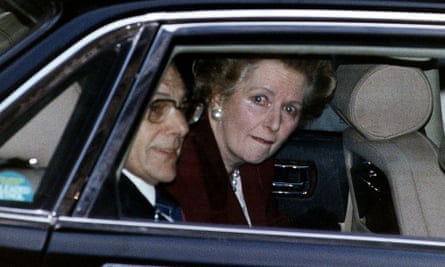
Yet the faultlines in Cameron’s own approach to Europe were always there too. The young Cameron was never one of those Tories who ate, drank and slept Europe; but nor was he an heir to the pro-European generation of liberal Tories such as Michael Heseltine and Kenneth Clarke. Instead, fatally as it has now transpired, he was always a “Eurosceptic – but not as Eurosceptic as you are”, as he put it to his first political boss, the former chancellor Norman Lamont. Cameron’s lifelong soft Euroscepticism meant he had no answer to the hardliners on Europe once the issue had become turbocharged by austerity and immigration.
Cameron’s differences with the more committed Eurosceptic wing of his party have always been over emphasis and tone, not substance. He has had no alternative vision of Europe to offer, in the face of the party’s Europhobes. Although he was always in favour of remaining, he failed to make the case for UK membership until almost the last minute. If Cameron’s default position had always been “Eurosceptic – but determined to make Europe work”, things might have been different. But it was the opposite. “I’m much more Eurosceptic than you imagine,” he once told Labour’s Denis MacShane.
When he was first running for parliament in the Oxfordshire constituency of Witney, which he won in 2001, Cameron characteristically tried to have the best of both Tory worlds on the issue. He should be thought of as a Eurosceptic, he told the centre-right libertarian Sean Gabb, “on the basis that I oppose the single currency and any further transfer of sovereignty from the UK to the EU”. But, Cameron added, he was not in favour of withdrawal and accepted the supremacy of EU law in some cases.
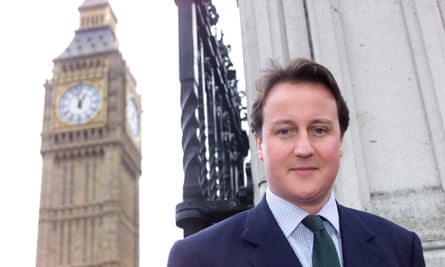
“Let me get this straight,” he repeated in a Guardian article in May 2003 about the EU constitution plan, which Tony Blair supported but on which the Labour party was reluctant to allow a referendum, “I am no Euro obsessive”. Readers could not accuse him of “excessive Daily Mail reading, too much time spent alone with Bill Cash or anything else”. But, he added, “the Euro-maniac Blair” would have to concede a referendum on “the wretched thing”.
“He’s Eurosceptic, no shadow of doubt,” the Tory pro-European grandee Sir Nicholas Soames told Lord Ashcroft and Isabel Oakeshott for their anti-Cameron biography Call Me Dave. “He’s immensely irritated by it and frustrated by it in every way. But he’s not a Get Out man.”
But nor was he ever explicitly enough a Stay In man. In 2005, as he began campaigning to succeed Michael Howard as the liberal and modernising alternative to what Theresa May famously called “nasty party” Toryism, Cameron promised that, under him, the Tories would pull out of the European People’s party alliance in the European parliament. He did it because he wanted to siphon votes from his rivals David Davis and Liam Fox by burnishing his own Eurosceptic credentials.

It is doubtful if that promise was decisive in Cameron’s victory as party leader. But it is certain that the decision drove a wedge between the Tories and their Christian Democratic, centre-right fellow parties in Europe. In particular it poisoned relations and trust with Angela Merkel, who was to be the key figure in European politics in the years ahead. Not for the first time, and certainly not for the last, Cameron put tactics before strategy in his handling of Europe.
So, when Cameron made his famous remarks to the Tory conference in 2006, his first speech as leader to the party, the warnings were more tactical than strategic. “Instead of talking about the things that most people care about, we talked about what we cared about most,” he reminded his party as he assessed the Tories’ third successive electoral defeat at Blair’s hands. “While parents worried about childcare, getting the kids to school, balancing work and family life, we were banging on about Europe.”
Many saw these words, especially in retrospect, as an attempt to shift the way the party approached Europe. But the words were an attack on the consequences of the party’s approach, not on the approach itself. Cameron was being consistent with his own soft Euroscepticism, not innovative in the way that might have equipped him to fight his corner more effectively when the referendum came in 2016.
Back in 2007, when Europe was gearing up for what became the Lisbon treaty on EU reforms, Cameron was again consistent in his own terms. First he pledged “a cast-iron guarantee” from the Tories to hold a referendum on the treaty. Two years later, with the general election now approaching, Cameron declared the guarantee was no longer relevant, since the treaty was now law and could not be reopened. He had managed both to fire up the hardliners and to outrage them.
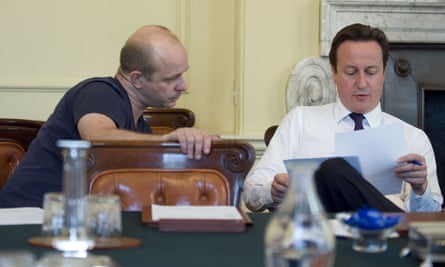
Yet Cameron did not make a virtue of his change of policy on the treaty by embracing it – even though it embodied many of the less centralising approaches to Europe that he had advocated. Throughout this time, his adviser Steve Hilton was pressing for Cameron to prepare the ground for exit from Europe. In practice, however, Cameron neither prepared for exit nor for engagement. Instead the juggling act continued.
The 2010 election, which was in most respects a triumph for Cameron, ensured ever more frantic juggling. Going into coalition with the pro-European Liberal Democrats meant the referendum on UK membership of the EU that many Conservatives continued to advocate was put in the deep freeze. The coalition’s official policy was that there would be no in/out referendum and that only Cameron and Nick Clegg could settle European policy between them.
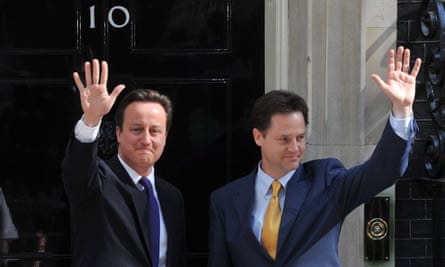
This was a purgatorial outcome for the hard Eurosceptics. Not only had Cameron made a coalition with the Liberal Dems, whom they despised; he had also sold the pass on Europe, again. The hard right’s revenge came in October 2011 when the MP David Nuttall’s motion for a referendum triggered the largest Tory postwar revolt on Europe, with 81 Eurosceptics voting against the government.
Two months later, Cameron tried to assuage his rebels by vetoing a eurozone rescue plan at an EU summit in Brussels. The clashes left Cameron isolated on both fronts. The Tory rebels, in Lord Finkelstein’s words, never took yes for an answer. Meanwhile Merkel and many of the other heads of government were outraged at Cameron’s defiance.
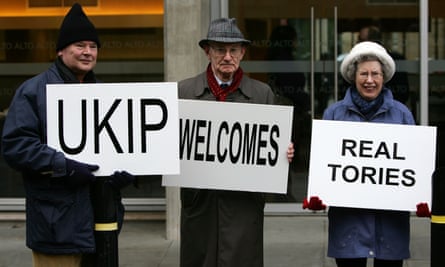
Although Cameron still tended at this time to treat the EU issue as a party management problem, the eurozone crisis and migration pressures were beginning to transform the issue into something much larger, much angrier and less manageable. The rise of Ukip – with whose policies a significant minority of Tory MPs agreed – pushed ever more Tories into the referendum camp. In June 2012, Cameron finally cracked and said a referendum might be necessary. From that moment the issue became when, not whether, Cameron would pledge a referendum as Tory policy at the next election.
When a worried Clegg challenged him in 2012, Cameron’s response was that of a tactical politician. “I have to do this. It is a party management issue. I am under a lot of pressure on this. I need to recalibrate,” he told Clegg, according to David Laws’s account of the coalition.
“He’s so busy wondering how to get through the next few weeks that he could endanger Britain’s international position for the next few decades. It’s all very very risky,” Clegg told Laws in 2012, wholly accurately as things were to turn out. When Clegg put this to Cameron later in 2012, Cameron’s reply was eloquent and to the point: “You may be right. But what else can I do? My backbenchers are unbelievably Eurosceptic and Ukip are breathing down my neck.”
After a long buildup, Cameron finally made his referendum pledge in 2013 in a speech at the Bloomberg offices in central London. The speech put the promise in the context of an unusually eloquent argument by Cameron for Britain to remain in the EU. Perhaps if he had gone into the 2015 election emphasising that Britain must stay, he would have been in a stronger position to stem the slide of ministers and backbenchers into the leave campaign in 2016. But Cameron didn’t do that. Once again, he let the issue go off the boil. Meanwhile, though, the pressure from immigration and the fear of Ukip transformed the political climate. Cameron only began to make the case to remain in the weeks running up to this week’s vote. By then the damage had been done.

Although Cameron had been expecting another hung parliament in 2015, he emerged from the general election unencumbered by coalition. As a result, the referendum pledge made at Bloomberg and set in stone in the Tory manifesto had to be banked. Throughout late 2015 and early 2016, Cameron bargained for concessions from EU partners whose minds were far more focused on the continued economic crisis, immigration from Syria and elsewhere, and terrorism.
The deal Cameron unveiled at the end of the Brussels summit on 19 February might have been a strong enough package to sell to an electorate that wanted to back a popular prime minister – as Harold Wilson’s equivalent deal was when Britain voted to stay in Europe in 1975. But times had changed. Cameron may have promised to fight “heart and soul” for Britain to stay in, but immigration, an impatient electorate and the absolute determination of the anti-European press and hard-sceptic MPs ensured that 2016 would be completely different.
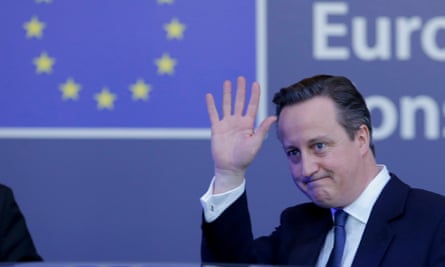
In the end, Cameron has been faced with forces and dynamics in British life that he has proved powerless to control. Indignation about immigration, disrespect for politicians, a reluctance to be frightened by warnings, press distortions and Labour’s weakness in delivering its vote all did their bit to fuel a general mood of popular payback against the political and economic establishment, as well as the EU. The remain campaign threw everything but the kitchen sink at their leave opponents, but the assaults only seemed to strengthen the mood of defiance. Even the killing of Jo Cox did nothing more than cause a temporary lull in the leave mood.
Three years ago, in a comment on Cameron’s referendum pledge in the Bloomberg speech, Tony Blair likened it to a comedy western of the 1970s. “It reminds me a bit of the Mel Brooks comedy Blazing Saddles where the sheriff says at one point as he holds a gun to his own head: ‘If you don’t do what I want I’ll blow my brains out,’” Blair warned.
This week, Cameron has done just that.